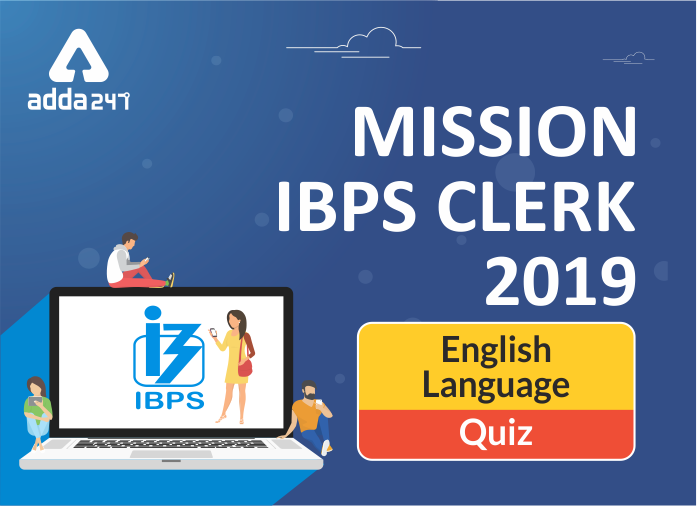IBPS Clerk Prelims English Quiz on Error-Detection
The English language perplexes most of the students and makes one nervous during the examination even if the answer to the question is known. But there are no formulas to cramp or the longer the calculation to deal with. The mistakes that occur are because of the lack of confidence. With proper strategy, Study Notes, Quizzes, Vocabulary one can calm his/her nerves and excel in no time. Make the reading newspaper, editorial a habit, and also participate in the daily quiz. The IBPS Clerk 2019 is just one step away from your reach. Here is the quiz under the Study Plan ‘FATEH’, on the IBPS Clerk Prelims English Quiz and we have Error-Detection for 27th of September 2019. You can also check out the latest books for IBPS Clerk 2019 exam.
Directions (1-15): Read each of the following sentences to find out if there is anygrammatical error in it. The error, if any, will be in one part of the sentence. The number (A, B, C or D) of this part is your answer. If there is no error in the statement, then mark option (e) as your answer choice.
Q1.Neither Brian nor (A)/ his wife were aware (B)/ of any laws regarding (C)/the sale of house (D)/No Error (E)
(a) A
(b) B
(c) C
(d) D
(e) No Error
S1. Ans. (b)
Sol. Instead of ‘were’, ‘was’ will be used because when two subjects are attached with ‘neither-nor’ then verb is used according to the nearest subject. Here, ‘his wife’ is in ‘third person and singular form’ hence, ‘was’ will replace ‘were’.
Q2. The decision to appoint an external (A)/ auditor for the bank is the mandate (B)/ of the board of governors, a body (C)/superior than the board of directors. (D)/ No Error (E)
(a) A
(b) B
(c) C
(d) D
(e) No Error
S2. Ans. (d)
Sol. ‘to’ will be used instead of ‘than’ because we do not use conjunction ‘than’ after superior, posterior, senior, interior, etc.
Q3. Even in today’s busy (A)/world, HGTV was able (B)/to get six actors (C)/ to commit to a project (D)/ No Error
(a) A
(b) B
(c) C
(d) D
(e) No Error
S3. Ans. (d)
Sol. Instead of ‘to commit’, ‘committed’ will be used because the given sentence is based on the construction given below:
(i) He got a house built.
(ii) He was able to get a house built.
Therefore, ‘HGTV was able to get six actors committed to a project.’
Q4. The majority of their (A)/income goes to rent (B)/and leaves them with hardly no (C)/money to buy nutritious food.(D)/ No Error (E)
(a) A
(b) B
(c) C
(d) D
(e) No Error
S4. Ans. (c)
Sol. ‘any’ will be used instead of ‘no’ as we use ‘any’ with ‘rarely’, ‘seldom’, scarcely’, ‘hardly’ etc. and not ‘no’.
Q5. As an independent adviser, he (A)/now runs an online advisory (B)/service and is recognized as one of (C)/the foremost trading expert.(D)/ No Error (E)
(a) A
(b) B
(c) C
(d) D
(e) No Error
S5. Ans. (d)
Sol. ‘experts’ will replace ‘expert’ because noun or pronoun is always plural with one of, any of, either of, neither of etc.
Q6. Mr. Modi reiterated India’s (A)/commitment to the creation of (B)/175 GW renewable energy capacity by (C)/2022 under the Paris Climate Agreement. (D)/ No Error (E)
(a) A
(b) B
(c) C
(d) D
(e) No Error
S6. Ans. (e)
Sol. The sentence is contextually meaningful and grammatically correct. Hence, there is ‘no error’.
Q7. No international body is (A)/entrusted in the task of (B)/prosecuting and punishing (C)/ those criminal offences.(D)/ No Error
(a) A
(b) B
(c) C
(d) D
(e) No Error
S7. Ans. (b)
Sol. Instead of ‘in’, ‘with’ will be used because ‘with’ accompanies ‘entrust’ in the sentence when the structure is ‘entrust+somebody+with +something’ whereas ‘to’ is used in the sentence when the structure of sentence is ‘entrust+something+to +somebody’.
Q8. I wondered whether it will be (A)/possible for me to write objectively (B)/about the man who has been (C)/such a profound influence on my life. (D)/ No Error (E)
(a) A
(b) B
(c) C
(d) D
(e) No Error
S8. Ans. (a)
Sol. ‘would’ will be used instead of ‘will’ because the sentence is in past tense.
Q9. One person asked me why had I (A)/not mentioned in my audio program (B)/the possibility that some people (C)/may abreact and discharge emotion. (D)/ No Error (E)
(a) A
(b) B
(c) C
(d) D
(e) No Error
S9. Ans. (a)
Sol. Instead of ‘why had I’, ‘why I had’ will be used because in indirect narration of an interrogative sentence, reported speech is Assertive (Subject +verb).
Q10. On reaching the station, she found that (A)/ she left the bag containing cash and (B)/other valuables in the (C)/ drawer of her bedroom.(D)/ No Error (E)
(a) A
(b) B
(c) C
(d) D
(e) No Error
S10. Ans. (b)
Sol. ‘she had left’ will be used in place of ‘she left’. Also, ‘she found’ is in past tense and ‘leaving bag and other valuables’ was also done in the past. Therefore, we use past perfect tense for incident of past of the past.
Q11. She had some casual clothes, (A)/ but those had to be hiding (B)/away since her parents frowned upon (C)/ anything they considered unladylike.(D)/ No Error (E)
(a) A
(b) B
(c) C
(d) D
(e) No Error
S11. Ans. (b)
Sol. Instead of ‘hiding’ it will be ‘hidden’ because in passive voice, ‘to be +third form of verb’ is used.
Q12. Because I really want to (A)/concentrate on my studies (B)/so I will try (C)/and write as I revise (D)/ No Error (E)
(a) A
(b) B
(c) C
(d) D
(e) No Error
S12. Ans. (c)
Sol. ‘so’ will not be used here as ‘because, as, since, etc.’ are conjunctions of reason and ‘so, therefore’ is not used after them.
Q13. At one point, one of (A)/them asked me that why I (B)/didn’t have my supervisor(C)/ down as a referee. (D)/ No Error (E)
(a) A
(b) B
(c) C
(d) D
(e) No Error
S13. Ans. (b)
Sol. ‘that’ will not be used because, in indirect narration, conjunction is not used before wh-question. For instance, he asked why I was late.
Q14. Do you doubted that who (A)/you are and what you’ve(B)/ done with your life really (C)/amounts too much at times?(D)/ No Error (E)
(a) A
(b) B
(c) C
(d) D
(e) No Error
S14. Ans. (a)
Sol. ‘doubt’ will be used instead of ‘doubted’ because each form of helping verb ‘do’ takes ‘first form of verb’. Other forms of ‘do’ are ‘does’ and ‘did’. For instance, does she sing?
Q15. The physician should perform (A)/ a thoroughly physical examination of (B)/the child, looking for any(C)/ unusual marks or bruises. (D)/No Error (E)
(a) A
(b) B
(c) C
(d) D
(e) No Error
S15. Ans. (b)
Sol. ‘thorough’ will be used instead of ‘thoroughly’ because the latter is an adverb while the former is an adjective. An adjective qualifies a noun and not an adverb.



 English Language Quiz For Bank Foundatio...
English Language Quiz For Bank Foundatio...
 English Language Quiz For SBI Clerk Prel...
English Language Quiz For SBI Clerk Prel...
 English Language Quiz For SBI Clerk Prel...
English Language Quiz For SBI Clerk Prel...









